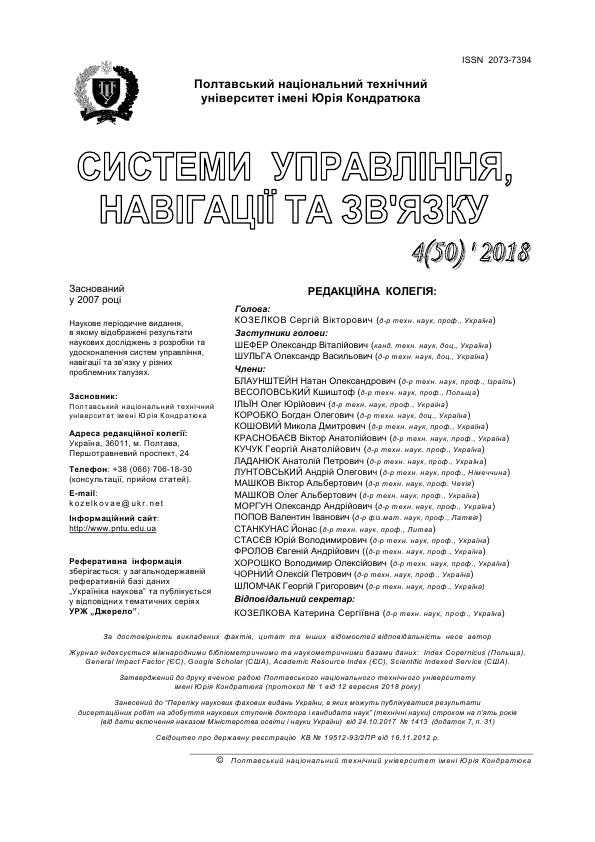ПРОБЛЕМИ СУЧАСНИХ РЕКОМЕНДАЦІЙНИХ СИСТЕМ ТА МЕТОДИ ЇХ РІШЕННЯ
DOI:
https://doi.org/10.26906/SUNZ.2018.4.120Ключові слова:
рекомендаційні системи, колаборативна фільтрація, контентна фільтрація, холодний старт, постійний холодний старт, бульбашка фільтрівАнотація
Предметом вивчення у статті є процес побудови рекомендаційних систем. Метою є дослідження проблем сучасних рекомендаційних систем та пошук методів їх рішення. Завдання: дослідити проблеми сучасних рекомендаційних систем, здійснити порівняльний аналіз існуючих методів побудови рекомендаційних систем з погляду наявності/відсутності у них розглянутих проблем, дослідити існуючі методи вирішення розглянутих проблем. Отримані такі результати: Розглянуто основні проблеми сучасних рекомендаційних систем: холодний старт для користувачів, холодний старт для об’єктів, постійний холодний старт для користувачів, постійний холодний старт для об’єктів, бульбашка фільтрів. Здійснено порівняльний аналіз відомих методів побудови рекомендаційних систем з точки зору наявності/відсутності у них розглянутих проблем. Визначено напрямки подальших досліджень для розробки методів вирішення існуючих проблем рекомендаційних систем. Висновки. Основними проблемами рекомендаційних систем є проблеми холодного старту для користувачів та для об’єктів, постійного холодного старту для користувачів та для об’єктів, а також проблема бульбашки фільтрів. На сьогоднішній день проблема холодного старту практично вирішена за допомогою використання контекстної інформації та створення гібридних рекомендаційних систем. В той же час актуальною стала проблема постійного холодного старту, повного рішення якої на даний час не існує. Перспективним напрямом рішення проблеми постійного холодного старту є використання алгоритмів штучного інтелекту для адаптації до можливих змін у ознаках об’єктів і вподобаннях користувачів. Для вирішення проблеми бульбашки фільтрів слід застосовувати додаткові вимоги до формування списку рекомендацій. Перспективним напрямком вирішення проблеми бульбашки фільтрів, як показало дослідження, є забезпечення формування списку рекомендацій з такими властивостями його елементів як неочікуваність, різноманітність та новизна. В той же час це дуже суб’єктивні показники, для яких ще не існує загальноприйнятих метрик для їх вимірювання та надійних методів забезпечення їх виконання.Завантаження
Посилання
Jones M. Recommender systems, Part 1. Introduction to approaches and algorithms. Learn about the concepts that underlie web recommendation engines / M. Jones – 2013. [Електронний ресурс] – Режим доступу: https://www.ibm.com/developerworks/opensource/library/os-recommender1/index.html?s_tact=105agx99&s_cmp=cp
Мелешко Є.В. Дослідження методів побудови рекомендаційних систем в мережі Інтернет / Є.В. Мелешко, Г.С. Семенов, В.Д. Хох. // Збірник наукових праць "Системи управління, навігації та зв’язку". Випуск 1(47). – Полтава: ПНТУ ім. Ю. Кондратюка. – 2018. – С. 131–136.
Сегаран Т. Программируем коллективный разум. – Пер. с англ. – СПб: Символ-Плюс, 2013. – 368 с.
Xiaoyuan Su and Taghi M. Khoshgoftaar A Survey of Collaborative Filtering Techniques A Survey of Collaborative Filtering Techniques // Hindawi Publishing Corporation, Advances in Artificial Intelligence archive, USA : журнал. — 2009. – P. 1 - 19.
Burke R. Hybrid Web Recommender Systems / Burke R.. // The Adaptive Web. Lecture Notes in Computer Science, vol 4321. Springer, Berlin, Heidelberg. – 2007. – С. 377–408.
Bernardi L., Kamps J., Kiseleva J., Mueller M.J.I. The Continuous Cold Start Problem in e-Commerce Recommender Systems. – 2015. [Електронний ресурс] – Режим доступу: https://www.researchgate.net/publication/280773072_The_Continuous_Cold_Start_Problem_in_e-Commerce_Recommender_Systems
Меньшикова Н.В. Обзор рекомендательных систем и возможностей учета контекста при формировании индивидуальных рекомендаций / Н. В. Меньшикова, И.В. Портнов, И.Е. Николаев. // ACADEMY. – 2016. – №6. – с. 20–22.
Амелькин С.А. Оценка эффективности рекомендательных систем // Труды 14-й Всероссийской научной конференции «Электронные библиотеки: перспективные методы и технологии, электронные коллекции» – RCDL-2012, Переславль-Залесский, 15-18 октября 2012 г. – С. 288-291.
Recommender Systems Handbook / Editors Francesco Ricci, Lior Rokach, Bracha Shapira, Paul B. Kantor. – 1st edition. – New York, NY, USA: Springer-Verlag New York, Inc., 2010. – 842 с.
Castells P., Vargas S., Wang J. Novelty and Diversity Metrics for Recommender Systems: Choice, Discovery and Relevance. [Електронний ресурс] – Режим доступу: http://ir.ii.uam.es/rim3/publications/ddr11.pdf.
Kotkov D., Konstan J.A., Zhao Q., Veijalainen J. Investigating Serendipity in Recommender Systems Based on Real User Feedback. [Електронний ресурс] – Режим доступу: https://www-users.cs.umn.edu/~zhaox331/papers/denis2018sac.pdf.
Kaminskas M., Bridge D. Measuring Surprise in Recommender Systems. [Електронний ресурс] – Режим доступу: https://www.insight-centre.org/sites/default/files/publications/recsys2014.pdf.
Castells P., Vargas S., Wang J. Novelty and Diversity Metrics for Recommender Systems: Choice, Discovery and Relevance / P. Castells, S. Vargas, J. Wang. – 2011. [Електронний ресурс] – Режим доступу: https://www.semanticscholar.org/paper/Novelty-and-Diversity-Metrics-for-Recommender-and-Castells-Vargas/4ec6bd672aaaa075b42a751099eb9317857e6e0c




